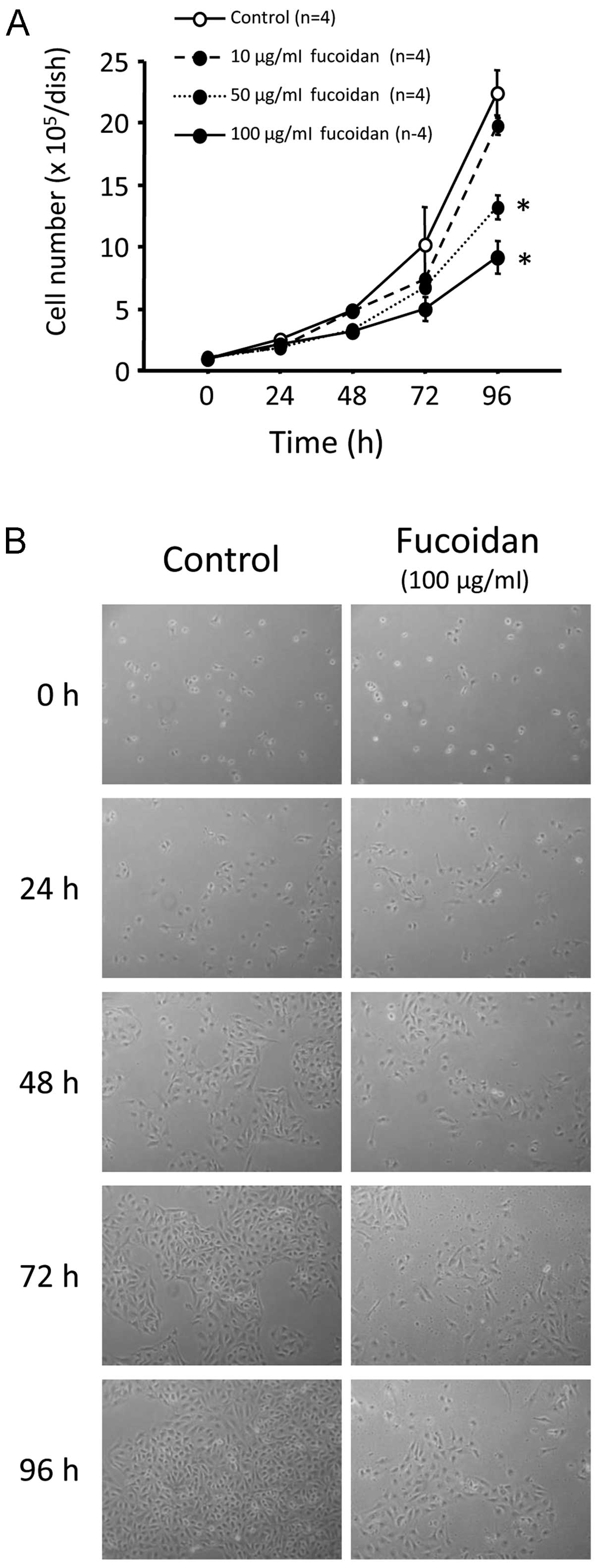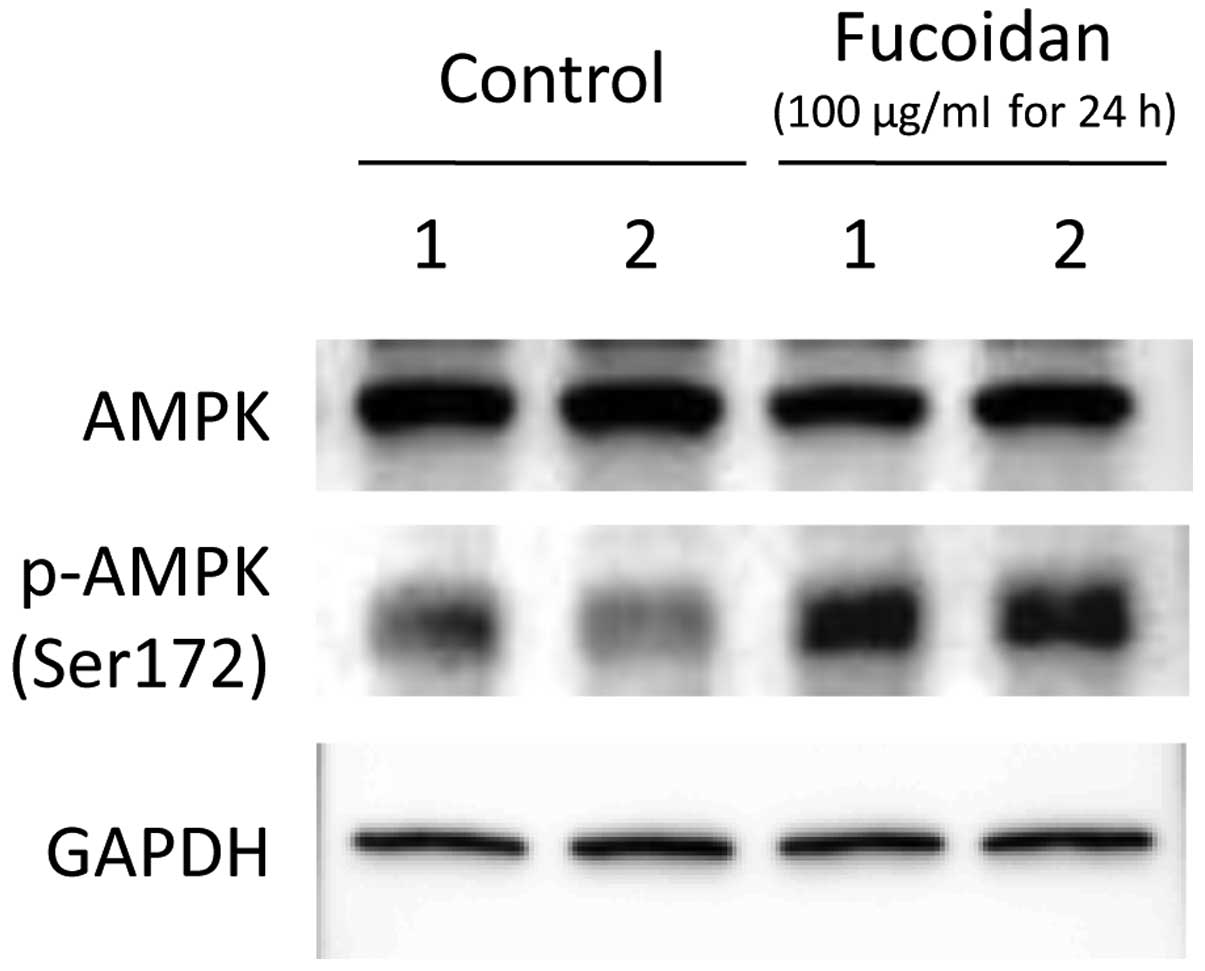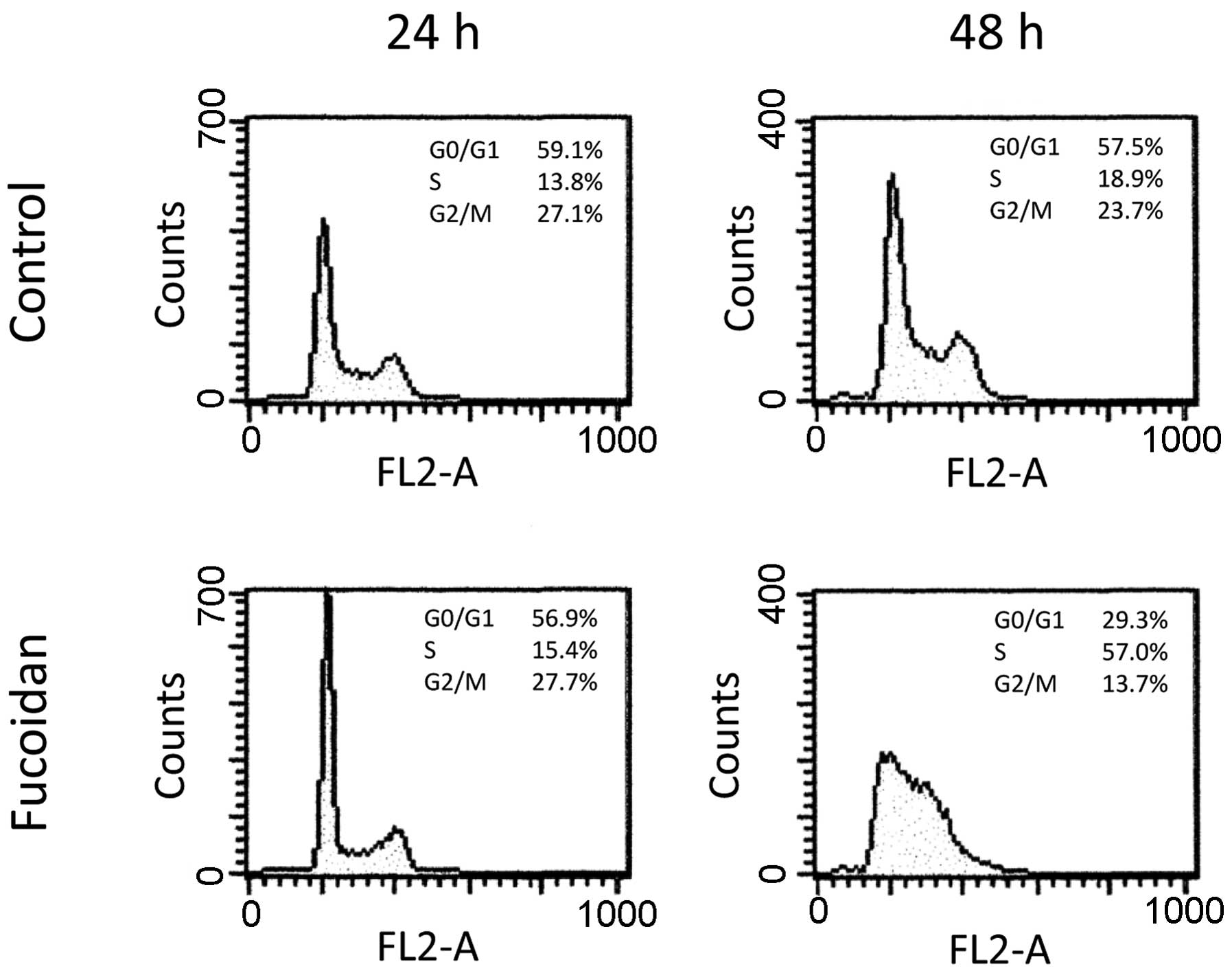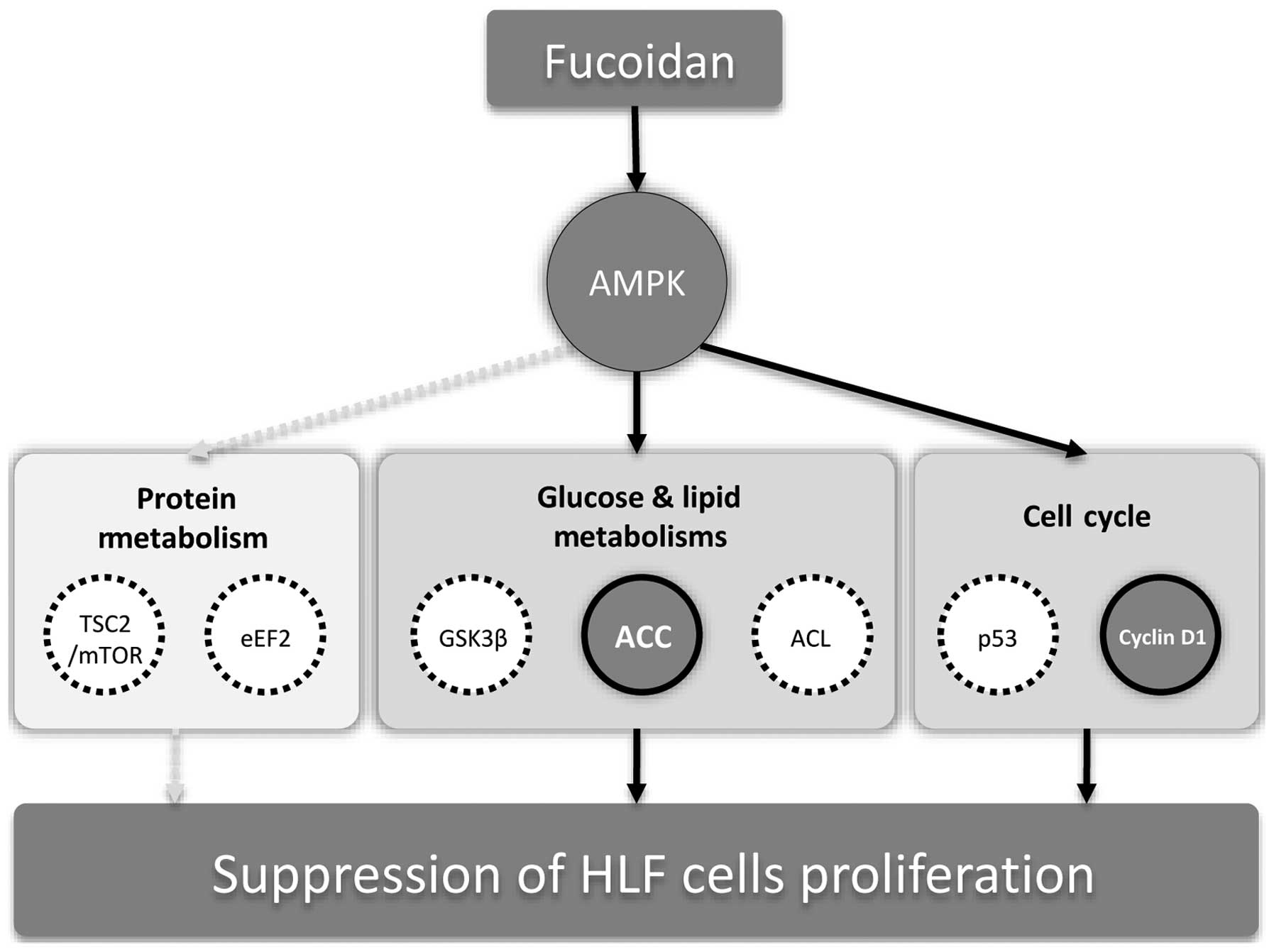|
1
|
Burroughs A, Hochhauser D and Meyer T:
Systemic treatment and liver transplantation for hepatocellular
carcinoma: Two ends of the therapeutic spectrum. Lancet Oncol.
5:409–418. 2004. View Article : Google Scholar : PubMed/NCBI
|
|
2
|
Kluger MD, Salceda JA, Laurent A, Tayar C,
Duvoux C, Decaens T, Luciani A, Van Nhieu JT, Azoulay D and Cherqui
D: Liver resection for hepatocellular carcinoma in 313 western
patients: tumor biology and underlying liver rather than tumor size
drive prognosis. J Hepatol. Dec 18–2014.(Epub ahead of print).
View Article : Google Scholar : PubMed/NCBI
|
|
3
|
Tanaka K and Sorai S: Hydrolysis of
fucoidan by abalone liver alpha-L-fucosidase. FEBS Lett. 9:45–48.
1970. View Article : Google Scholar : PubMed/NCBI
|
|
4
|
Cui W, Zheng Y, Zhang Q, Wang J, Wang L,
Yang W, Guo C, Gao W, Wang X and Luo D: Low-molecular-weight
fucoidan protects endothelial function and ameliorates basal
hypertension in diabetic Goto-Kakizaki rats. Lab Invest.
94:382–393. 2014. View Article : Google Scholar : PubMed/NCBI
|
|
5
|
Fitton JH: Therapies from fucoidan;
multifunctional marine polymers. Mar Drugs. 9:1731–1760. 2011.
View Article : Google Scholar : PubMed/NCBI
|
|
6
|
Boo HJ, Hong JY, Kim SC, Kang JI, Kim MK,
Kim EJ, Hyun JW, Koh YS, Yoo ES, Kwon JM, et al: The anticancer
effect of fucoidan in PC-3 prostate cancer cells. Mar Drugs.
11:2982–2999. 2013. View Article : Google Scholar : PubMed/NCBI
|
|
7
|
Kim EJ, Park SY, Lee JY and Park JH:
Fucoidan present in brown algae induces apoptosis of human colon
cancer cells. BMC Gastroenterol. 10:962010. View Article : Google Scholar : PubMed/NCBI
|
|
8
|
Xue M, Ge Y, Zhang J, Wang Q, Hou L, Liu
Y, Sun L and Li Q: Anticancer properties and mechanisms of fucoidan
on mouse breast cancer in vitro and in vivo. PLoS One.
7:e434832012. View Article : Google Scholar : PubMed/NCBI
|
|
9
|
Min EY, Kim IH, Lee J, Kim EY, Choi YH and
Nam TJ: The effects of fucodian on senescence are controlled by the
p16INK4a-pRb and p14Arf-p53 pathways in hepatocellular carcinoma
and hepatic cell lines. Int J Oncol. 45:47–56. 2014.PubMed/NCBI
|
|
10
|
Yuan HD and Piao GC: An active part of
Artemisia sacrorum Ledeb. suppresses gluconeogenesis through AMPK
mediated GSK3β and CREB phosphorylation in human HepG2 cells.
Biosci Biotechnol Biochem. 75:1079–1084. 2011. View Article : Google Scholar
|
|
11
|
Roshan S, Liu YY, Banafa A, Chen HJ, Li
KX, Yang GX, He GY and Chen MJ: Fucoidan induces apoptosis of HepG2
cells by down-regulating p-Stat3. J Huazhong Univ Sci Technolog Med
Sci. 34:330–336. 2014. View Article : Google Scholar : PubMed/NCBI
|
|
12
|
Zhu C, Cao R, Zhang SX, Man YN and Wu XZ:
Fucoidan inhibits the growth of hepatocellular carcinoma
independent of angiogenesis. Evid Based Complement Alternat Med.
2013:6925492013. View Article : Google Scholar : PubMed/NCBI
|
|
13
|
Nagamine T, Hayakawa K, Kusakabe T, Takada
H, Nakazato K, Hisanaga E and Iha M: Inhibitory effect of fucoidan
on Huh7 hepatoma cells through downregulation of CXCL12. Nutr
Cancer. 61:340–347. 2009. View Article : Google Scholar : PubMed/NCBI
|
|
14
|
Fukahori S, Yano H, Akiba J, Ogasawara S,
Momosaki S, Sanada S, Kuratomi K, Ishizaki Y, Moriya F, Yagi M, et
al: Fucoidan, a major component of brown seaweed, prohibits the
growth of human cancer cell lines in vitro. Mol Med Rep. 1:537–542.
2008.PubMed/NCBI
|
|
15
|
Hardie DG: AMPK - sensing energy while
talking to other signaling pathways. Cell Metab. 20:939–952. 2014.
View Article : Google Scholar : PubMed/NCBI
|
|
16
|
Lacher MD, Pincheira R, Zhu Z,
Camoretti-Mercado B, Matli M, Warren RS and Castro AF: Rheb
activates AMPK and reduces p27Kip1 levels in Tsc2-null cells via
mTORC1-independent mechanisms: Implications for cell proliferation
and tumorigenesis. Oncogene. 29:6543–6556. 2010. View Article : Google Scholar : PubMed/NCBI
|
|
17
|
Motoshima H, Goldstein BJ, Igata M and
Araki E: AMPK and cell proliferation - AMPK as a therapeutic target
for atherosclerosis and cancer. J Physiol. 574:63–71. 2006.
View Article : Google Scholar : PubMed/NCBI
|
|
18
|
Hashimoto O, Shinkawa M, Torimura T,
Nakamura T, Selvendiran K, Sakamoto M, Koga H, Ueno T and Sata M:
Cell cycle regulation by the Wee1 inhibitor PD0166285, pyrido
[2,3-d] pyimidine, in the B16 mouse melanoma cell line. BMC Cancer.
6:2922006. View Article : Google Scholar
|
|
19
|
Kawaguchi T, Yoshida T, Harada M, Hisamoto
T, Nagao Y, Ide T, Taniguchi E, Kumemura H, Hanada S, Maeyama M, et
al: Hepatitis C virus down-regulates insulin receptor substrates 1
and 2 through up-regulation of suppressor of cytokine signaling 3.
Am J Pathol. 165:1499–1508. 2004. View Article : Google Scholar : PubMed/NCBI
|
|
20
|
Selvendiran K, Koga H, Ueno T, Yoshida T,
Maeyama M, Torimura T, Yano H, Kojiro M and Sata M: Luteolin
promotes degradation in signal transducer and activator of
transcription 3 in human hepatoma cells: An implication for the
antitumor potential of flavonoids. Cancer Res. 66:4826–4834. 2006.
View Article : Google Scholar : PubMed/NCBI
|
|
21
|
Kawaguchi T, Sakisaka S, Mitsuyama K,
Harada M, Koga H, Taniguchi E, Sasatomi K, Kimura R, Ueno T, Sawada
N, et al: Cholestasis with altered structure and function of
hepatocyte tight junction and decreased expression of canalicular
multispecific organic anion transporter in a rat model of colitis.
Hepatology. 31:1285–1295. 2000. View Article : Google Scholar : PubMed/NCBI
|
|
22
|
Matsumoto A, Ono M, Fujimoto Y, Gallo RL,
Bernfield M and Kohgo Y: Reduced expression of syndecan-1 in human
hepatocellular carcinoma with high metastatic potential. Int J
Cancer. 74:482–491. 1997. View Article : Google Scholar : PubMed/NCBI
|
|
23
|
Yamamoto T, Nagano H, Sakon M, Wada H,
Eguchi H, Kondo M, Damdinsuren B, Ota H, Nakamura M, Wada H, et al:
Partial contribution of tumor necrosis factor-related
apoptosis-inducing ligand (TRAIL)/TRAIL receptor pathway to
antitumor effects of interferon-alpha/5-fluorouracil against
hepatocellular carcinoma. Clin Cancer Res. 10:7884–7895. 2004.
View Article : Google Scholar : PubMed/NCBI
|
|
24
|
Park HY, Kim GY, Moon SK, Kim WJ, Yoo YH
and Choi YH: Fucoidan inhibits the proliferation of human urinary
bladder cancer T24 cells by blocking cell cycle progression and
inducing apoptosis. Molecules. 19:5981–5998. 2014. View Article : Google Scholar : PubMed/NCBI
|
|
25
|
Leprivier G, Remke M, Rotblat B, Dubuc A,
Mateo AR, Kool M, Agnihotri S, El-Naggar A, Yu B, Somasekharan SP,
et al: The eEF2 kinase confers resistance to nutrient deprivation
by blocking translation elongation. Cell. 153:1064–1079. 2013.
View Article : Google Scholar : PubMed/NCBI
|
|
26
|
Lee H, Kim JS and Kim E: Fucoidan from
seaweed Fucus vesiculosus inhibits migration and invasion of human
lung cancer cell via PI3K-Akt-mTOR pathways. PLoS One.
7:e506242012. View Article : Google Scholar : PubMed/NCBI
|
|
27
|
Migita T, Okabe S, Ikeda K, Igarashi S,
Sugawara S, Tomida A, Taguchi R, Soga T and Seimiya H: Inhibition
of ATP citrate lyase induces an anticancer effect via reactive
oxygen species: AMPK as a predictive biomarker for therapeutic
impact. Am J Pathol. 182:1800–1810. 2013. View Article : Google Scholar : PubMed/NCBI
|
|
28
|
Hopkins TA, Dyck JR and Lopaschuk GD:
AMP-activated protein kinase regulation of fatty acid oxidation in
the ischaemic heart. Biochem Soc Trans. 31:207–212. 2003.
View Article : Google Scholar : PubMed/NCBI
|
|
29
|
Scaglia N, Chisholm JW and Igal RA:
Inhibition of stearoylCoA desaturase-1 inactivates acetyl-CoA
carboxylase and impairs proliferation in cancer cells: Role of
AMPK. PLoS One. 4:e68122009. View Article : Google Scholar : PubMed/NCBI
|
|
30
|
Chang NW, Wu CT, Chen DR, Yeh CY and Lin
C: High levels of arachidonic acid and peroxisome
proliferator-activated receptor-alpha in breast cancer tissues are
associated with promoting cancer cell proliferation. J Nutr
Biochem. 24:274–281. 2013. View Article : Google Scholar
|
|
31
|
Hadad SM, Hardie DG, Appleyard V and
Thompson AM: Effects of metformin on breast cancer cell
proliferation, the AMPK pathway and the cell cycle. Clin Transl
Oncol. 16:746–752. 2014. View Article : Google Scholar
|
|
32
|
Lin VC, Tsai YC, Lin JN, Fan LL, Pan MH,
Ho CT, Wu JY and Way TD: Activation of AMPK by pterostilbene
suppresses lipogenesis and cell-cycle progression in p53 positive
and negative human prostate cancer cells. J Agric Food Chem.
60:6399–6407. 2012. View Article : Google Scholar : PubMed/NCBI
|
|
33
|
Rattan R, Giri S, Hartmann LC and Shridhar
V: Metformin attenuates ovarian cancer cell growth in an AMP-kinase
dispensable manner. J Cell Mol Med. 15:166–178. 2011. View Article : Google Scholar
|
|
34
|
Santra MK, Wajapeyee N and Green MR: F-box
protein FBXO31 mediates cyclin D1 degradation to induce G1 arrest
after DNA damage. Nature. 459:722–725. 2009. View Article : Google Scholar : PubMed/NCBI
|
|
35
|
Sikka A, Kaur M, Agarwal C, Deep G and
Agarwal R: Metformin suppresses growth of human head and neck
squamous cell carcinoma via global inhibition of protein
translation. Cell Cycle. 11:1374–1382. 2012. View Article : Google Scholar : PubMed/NCBI
|
|
36
|
Zi FM, He JS, Li Y, Wu C, Yang L, Yang Y,
Wang LJ, He DH, Zhao Y, Wu WJ, et al: Metformin displays
anti-myeloma activity and synergistic effect with dexamethasone in
in vitro and in vivo xenograft models. Cancer Lett. 356:443–453.
2015. View Article : Google Scholar
|
|
37
|
Banafa AM, Roshan S, Liu YY, Chen HJ, Chen
MJ, Yang GX and He GY: Fucoidan induces G1 phase arrest and
apoptosis through caspases-dependent pathway and ROS induction in
human breast cancer MCF-7 cells. J Huazhong Univ Sci Technolog Med
Sci. 33:717–724. 2013. View Article : Google Scholar : PubMed/NCBI
|





















